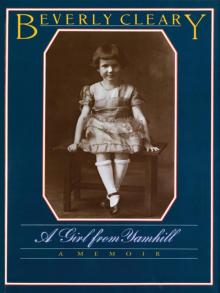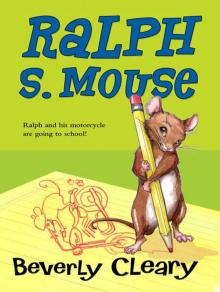- Home
- Beverly Cleary
Jean and Johnny Page 2
Jean and Johnny Read online
Page 2
“Come in,” called out Mr. Mundy, when Jean had run up the steps and tapped on the front door.
As Jean stepped out of the cold air into the warm room, fragrant with Christmas greens, vapor formed on her glasses as quickly as if a white curtain had been jerked down before her eyes. She pulled off her glasses and waved them around to let the moisture evaporate.
“Hello there, Half Pint,” said Mr. Mundy jovially.
“Mr. Mundy, I’ll have you know that I am five feet one-and-one-quarter inches tall,” said Jean, who was used to being teased about her size by her best friend’s father. “I was measured in gym last week.”
“Imagine that,” remarked Mr. Mundy. “Pretty soon you’ll have to pay full price at the movies.”
“Oh, Dad, cut it out,” called Elaine from the kitchen. “Jean has paid full admission for years.”
“I need Jean’s help,” said Mrs. Mundy, also from the kitchen. “Come on, Jean.”
Cedar boughs were heaped on newspapers on the kitchen floor. On the table lay a stack of Christmas wreaths and a pile of wire coat hangers that had been bent into circles. Mrs. Mundy, a plump, pleasant-looking woman, was wiring greens to the circles while Elaine fastened clusters of gilded eucalyptus buds to the wreaths. Elaine, who took after her father, was tall, thin, slightly round shouldered, and the kind of girl who could never keep her shirttail tucked in. She said Jean made her feel gawky, all knees and elbows. Jean said Elaine made her feel like someone who should buy her clothes in the children’s department. “The long and the short of it,” Mr. Mundy often remarked when he saw the girls together, and that was almost every day.
“What would you like me to do?” asked Jean, pleased that they were going to make wreaths instead of writing letters.
“Take the garden clippers and snip off pieces of cedar for me—limber pieces that I can bend around the wire,” directed Mrs. Mundy. “When we finish another half dozen I can deliver them to the clubhouse. Our lodge is having a bridge luncheon tomorrow, and I am in charge of the decorations.”
“And you know Mom,” said Elaine. “Always leaving everything to the last minute.”
“Oh, not always,” protested Mrs. Mundy, smiling.
The three worked swiftly. Jean enjoyed the fragrance of the cedar. Decorating for a party, even someone else’s party, made her feel so festive she was almost sorry to see the last coat hanger camouflaged with green and the last cluster of eucalyptus buds wired into place.
“There,” said Mrs. Mundy, with an air of having accomplished something. “Wouldn’t you girls like to drive over to the clubhouse with me while I deliver these?”
The girls agreed that a ride across town would be a pleasant change. They put on their coats and carried the wreaths out to the car. Jean found it agreeable to have the illusion of going someplace, of doing something different, even though she was only going along on someone else’s errand. Riding in a wreath-filled car on the first night of Christmas vacation seemed a promise of fun and festivity.
“Three and a half months,” whispered Elaine, who could be referring to only one thing—Kip Laddish’s personal appearance.
“Three and a half months,” answered Jean fervently, as she enjoyed the lighted Christmas trees in the windows along the street.
When they reached the clubhouse they saw light streaming from the windows and heard bursts of music as the door opened and closed. “Come on, girls,” said Mrs. Mundy briskly. “There’s an armload for each of us. We’ll just leave them in the kitchen for tonight. I am coming over in the morning with the rest of the committee after the decorations from the dance have been cleared out.” The girls, with their loads of wreaths, followed Mrs. Mundy into the building and past the ceiling-high Christmas tree in the lobby into the kitchen, which smelled of stale coffee. They piled their wreaths on the long drainboard beside a row of gallon coffeepots.
“There, that’s done,” said Mrs. Mundy. “Now I have a few things to attend to in the office. Why don’t you girls go in and watch the dance for a few minutes?”
“Yes, let’s,” said Elaine eagerly, and Jean agreed. It would be fun to see what others were doing for a good time on the first night of Christmas vacation.
The girls slipped through the door into the room where the party was being held. “There are some chairs along the wall,” whispered Elaine. “Let’s sit there.”
The two girls pulled off their coats and sat on the hard folding chairs. “I hope we don’t look like wallflowers,” murmured Elaine.
“Not in these school clothes. They’ll know we aren’t part of the crowd,” answered Jean. “For us, I guess you could call dancing a spectator sport.”
“I see some juniors and seniors from school,” observed Elaine, “and a few fellows and girls home from college.”
Jean did not answer. She was too absorbed in the scene before her. It seemed to her an enchanting picture in motion. The room was fragrant with garlands of Christmas greens, and from the center of the ceiling hung a revolving ball made of bits of mirror that cast flakes of light, like confetti, over the boys in their dark suits and the girls in their light dresses. Never had Jean seen so many pretty dresses before—dresses of net and taffeta and lace, all of them fresh and graceful. And the flowers—the girls wore flowers on their shoulders or in their hair or pinned to their sashes. The fragrance of gardenias mingled with the scent of the greens.
“Some of them are even wearing orchids,” whispered Elaine.
“I know.” Jean’s eyes slid from the flowers to the shoes—slippers and sandals of silver and gold and tinted satin. And for every pair of delicate shoes there was a pair of polished black shoes.
“When I have a formal I want a pair of shoes dyed to match,” whispered Elaine. “You can buy the shoes at Belmonts’ for six ninety-nine, and the store tints them free.”
Jean felt a twinge of annoyance. She wanted to take in the scene before her without thinking of the cost of shoes or the problems of matching dye to swatches of material.
“Kip Laddish has a new record of that piece the band is playing,” said Elaine. “I’m going to buy it when I get my allowance.”
The music stopped, and couples drifted to the edge of the room. The flowers, the smiling faces, the dresses dappled by the mirrored light made, it seemed to Jean, one of the loveliest scenes she had ever watched.
And then quite unexpectedly a boy was standing in front of Jean. A tall boy in a dark suit. A boy with a pleasant smile. “May I have this dance?” he asked.
He must be speaking to someone else. Jean felt Elaine nudge her.
“May I have this dance?” he repeated.
“Me?” Jean stared at the boy in disbelief, even though he was standing directly in front of her. A boy—asking Jean Jarrett to step into the scene before her?
“Yes, you,” answered the boy, with an engaging smile.
Like a girl walking in her sleep, Jean rose from her chair and stepped forward. The music started. The boy put his arm around her and took her right hand in his left. She laid her left hand on his right shoulder. She was in the boy’s arms, a part of the scene she had been watching. She felt as if she had stepped into a dream.
It was then that reality intruded. Jean remembered that she did not know how to dance.
The boy took a step, and Jean stumbled. “I-I’m sorry,” she managed to say. “I’m not a very good dancer.”
“That’s all right,” he said cheerfully. “I won’t try anything fancy.”
But he knows, thought Jean. Two steps, and already he knew she did not know how to dance. Her mind was awhirl. All she could think clearly was, My skirt. My awful homemade skirt with the jogs in the plaid. And she was wearing bobby socks and saddle shoes. Heavy, flat shoes. Sensible shoes that would wear a long time. Her hands grew icy, and her right hand, she now discovered, was sticky from the pitch on the Christmas wreaths. She stumbled. She stumbled again. She wanted to break away from this boy and flee through the crowd, but she did not have the
courage. She did not understand how she had managed to get herself into this situation—it had seemed so natural and so wonderful that first moment when she had risen from her chair and stepped toward him—and now…this….
The boy simplified his steps until he was walking to music and Jean only had to slide her feet backward. Then she found she did not know what to do with her face. In her flat shoes she could not see over his shoulder. She was afraid of smearing lipstick on his coat so she thrust her chin upward. She found this awkward and felt that she must be wearing the strained look Dandy wore when he swam and tried to keep his chin out of water. She tried turning her face to the right. Although still not very comfortable, this was better. At least she had a good view of the shirtfront of this boy, whoever he was.
They danced, or rather walked, in silence. Jean wondered desperately how much longer the music would go on. At the same time she was aware that the boy smelled pleasantly of clean wool and soap. Why, I never knew before that a boy could smell good, she thought in surprise. She had not, in fact, thought much about real boys at all. What boy would be interested in a fifteen-year-old girl who could pass for thirteen and who wore glasses, besides? Boys were people who lived in the same neighborhood and went to the same school. Some of them were agreeable to talk to once in a while and some were noisy nuisances. Certainly she had not thought of any of them as dancing partners—that would come in that vague and happy time, the future. It had been so much easier to dream about a boy who followed a tap-dancing bottle of shampoo onto the television screen. With that boy she would be dancing lightly, gracefully…but with this boy, this real, live boy…Well, it was all so different from her dreams.
Jean stepped squarely on the boy’s toe. “Excuse me,” she managed to say.
“That’s all right,” he answered.
The music stopped, and Jean felt as if she had been set free. Then she remembered this was only a pause, that each dance was divided into three parts. Feeling that it was only fair to offer the boy his freedom, she looked up uncertainly at him while she surreptitiously wiped the palms of her clammy hands on her skirt.
The boy grinned. “You’re catching on,” he said.
It was nice of him to say it. Jean did not know what to answer. She looked down at the floor and saw that her white saddle shoes were now marked with black polish. The boy’s shoes were streaked with her white shoe cleaner.
The music began again, the boy put his arm around Jean, and once more she found herself propelled around the room. She caught a glimpse of Elaine staring at her and, beside her, Mrs. Mundy watching with amusement. How ridiculous I must look, thought Jean, seeing herself in relation to the rest of the crowd for the first time, walking around backward in saddle shoes and an old blouse and that skirt—that awful skirt—when all the other girls looked so pretty.
This time the boy stepped on Jean’s toe. “I’m sorry,” he said pleasantly.
At least he was game. Jean was too miserable to answer.
The music stopped. Two down and one to go, thought Jean, unless she could escape. The thing to do was look this boy, whoever he was, in the eye and excuse herself quickly before the music started again. But when she forced herself to look him in the eye, her resolution wavered. He was so good-looking—tall with dark hair and a jaunty bow tie. Now she knew that she had seen him around school during the past semester. He was a senior, she was sure, but who was he?
“Do you go to Northgate High?” asked the boy.
Jean nodded. He had not remembered seeing her around school—but why should he? And then her courage returned. “Please excuse me,” she said swiftly, her cheeks hot. “I really don’t know how to dance and I should not have accepted.” She turned and as she turned, she thought—she couldn’t be sure—that he put out his hand to stop her. She did not wait to find out. She made her way past the other couples, the net and taffeta of the other girls’ skirts brushing against her bare legs.
When she reached her chair against the wall, Jean snatched up her coat. “Come on, Elaine,” she whispered. “Let’s get out of here!”
Elaine followed her into the lobby. “Jean,” she said eagerly, “how did you have the courage?”
“I don’t know,” answered Jean weakly. “I just did. Only it wasn’t courage exactly. I guess I didn’t know any better.”
Mrs. Mundy joined the girls beside the Christmas tree. “Jean, you did splendidly,” she said warmly.
Jean managed to smile. She knew this was not true, but it was Mrs. Mundy’s nature always to look at the cheerful side.
“What was his name?” asked Elaine.
“I don’t know,” admitted Jean.
“You don’t know?” Elaine was disbelieving. “Didn’t you ask him?”
“I couldn’t,” said Jean. “I was too busy thinking about my feet.” Those two feet in bobby socks and saddle shoes. “I couldn’t talk and think about my feet at the same time. I—I can’t even remember what he looked like. Not very clearly anyway, except that he was wearing a bow tie.”
“I can,” said Elaine. “He was terribly good-looking. He even had curly hair.”
“Then why did he want to dance with me?” Jean was genuinely bewildered. Why should a boy want to dance with a strange girl who was not even dressed for the party?
“I don’t know,” said Elaine. “But he did. That’s what counts.”
The two girls followed Elaine’s mother out to the car. “Jean,” whispered Elaine, as they climbed into the backseat, “was it fun, dancing with a good-looking boy?”
“Well…no,” said Jean honestly. “It was really pretty awful. You know—me in saddle shoes with my hands all clammy and not knowing how to dance.”
“I know.” There was real regret in Elaine’s voice. Mrs. Mundy pushed the starter button. “Jean, you must be very happy to have had such a nice-looking boy ask you to dance,” she remarked.
“Yes,” answered Jean, because Mrs. Mundy, a firm believer in positive thinking, would expect an affirmative answer. And yet she really was happy. That was the funny part of it. She had been miserable, but there was more to her feelings than that. She sensed that Elaine was holding back a flood of questions, because there were some things girls did not like to talk about in front of their mothers.
Jean was glad to have a chance to think about her experience, to try to decide how she really did feel about it. It was surprisingly difficult to remember. She was left with an impression of a boy’s pleasant voice, of his dark woolen shoulder and white shirtfront, of music and the feel of his toe treading on hers, of other couples moving past, and of her own confusion.
All at once it became important that Jean remember everything, every single little detail. She tried to recall what music had been played, but she could not. The only thing she could recall distinctly was the clean wool-and-soap smell of the boy. The rest was just a blur.
It was all so puzzling. Jean had had an embarrassing, uncomfortable experience, and yet it had left her feeling happy. Never before had she felt happy over her own embarrassment. And then she understood. For the first time in her life a boy had singled her out of a crowd. A boy, a real live boy…Why, the future had arrived!
Mrs. Mundy stopped the car in front of the Jarretts’ house and, after saying good night, waited until Jean was safely in the house.
The living room was empty. Jean snapped off the light and went to the room she shared with her sister. Sue was sitting in front of the portable sewing machine set up on the table that the girls shared for study and for sewing. On the bed was a row of red and green felt slippers with turned-up toes. On the toe of each was a little bell.
“How perfectly darling!” exclaimed Jean.
“This represents most of my Christmas shopping. I can make them for practically nothing, and they would cost a lot to buy,” answered Sue. “I love to make things out of felt. It never has to be hemmed.”
Without removing her coat, Jean sat down on the bed and absently picked up a slipper and swung it bac
k and forth to make the bell jingle.
“You look sort of dazed,” remarked Sue.
Jean dropped the slipper and looked at her sister. “I guess I am.”
“Why?” asked Sue amiably. “Too many Kip Laddish records at Elaine’s house?”
“You know, it was the funniest thing,” said Jean, “but something nice really did happen.”
Chapter 2
The first thing Jean discovered after the dance was that once a boy singles a girl out of a crowd for the first time, her life is never quite the same again. She discovered this when she started to clean her saddle shoes. She shook the bottle of cleaner, poured a little of the fluid onto a cloth, picked up her shoe, and looked thoughtfully at the streaks of black shoe polish on the white leather. Smiling to herself, she put the cap back on the bottle of cleaner and returned the bottle to the closet. There was no hurry about rubbing off the marks the boy’s shoes had made on hers. Instead of cleaning her shoes as she always did on Saturday morning, she sat staring dreamily at her smudged toes, while in her mind’s eye she saw the boy, whoever he was, in his room just before the dance, giving his shoes a last-minute shine. Perhaps he had been whistling as he bent over and snapped a cloth back and forth across his toes. Then he must have straightened up, put away the polish, slipped into his coat, and paused, still whistling, in front of his mirror to straighten his tie and run a comb through the hair Elaine had said was curly.
Jean enjoyed the scene so much she ran through it once more, this time adding wall-to-wall carpeting to the boy’s room and having him tuck a folded handkerchief into his breast pocket. And what about his shoes this morning? Was he polishing off the white marks she had left on the black leather? Maybe that was what he was doing this very minute. It was the beginning of a period of absentmindedness for Jean.
And then there was the matter of clothes. Jean hung the mismatched plaid skirt in the back of her closet and hoped her mother would not notice that she did not wear it. She longed for a closet full of pretty clothes. Until now she had been satisfied with the dresses her mother made for her or that she made for herself, and with the sweaters that her mother bought at sales. Now Jean looked at fashions in the morning paper and lingered over the advertisements of the Northgate Apparel Shop. She spent a lot of time in the bathroom, where the light was best, looking at the back of her shoulder-length hair in a hand minor, pulling a comb through her locks, and shaking her head to make her hair swing back and forth like a model in a television commercial for shampoo. Her family often had to pound on the bathroom door and remind her that the bathroom was not hers exclusively.

 Ramona Quimby, Age 8
Ramona Quimby, Age 8 Dear Mr. Henshaw
Dear Mr. Henshaw Beezus and Ramona
Beezus and Ramona A Girl from Yamhill
A Girl from Yamhill Ramona Forever
Ramona Forever Jean and Johnny
Jean and Johnny The Luckiest Girl
The Luckiest Girl Emily's Runaway Imagination
Emily's Runaway Imagination Ribsy
Ribsy Ramona the Pest
Ramona the Pest Socks
Socks Ramona's World
Ramona's World Strider
Strider The Mouse and the Motorcycle
The Mouse and the Motorcycle Henry and the Paper Route
Henry and the Paper Route Ramona the Brave
Ramona the Brave Henry Huggins
Henry Huggins Ramona and Her Mother
Ramona and Her Mother Ralph S. Mouse
Ralph S. Mouse Sister of the Bride
Sister of the Bride Henry and the Clubhouse
Henry and the Clubhouse Muggie Maggie
Muggie Maggie Runaway Ralph
Runaway Ralph Ramona and Her Father
Ramona and Her Father Henry and Ribsy
Henry and Ribsy Henry and Beezus
Henry and Beezus Two Times the Fun
Two Times the Fun Fifteen
Fifteen Mitch and Amy
Mitch and Amy